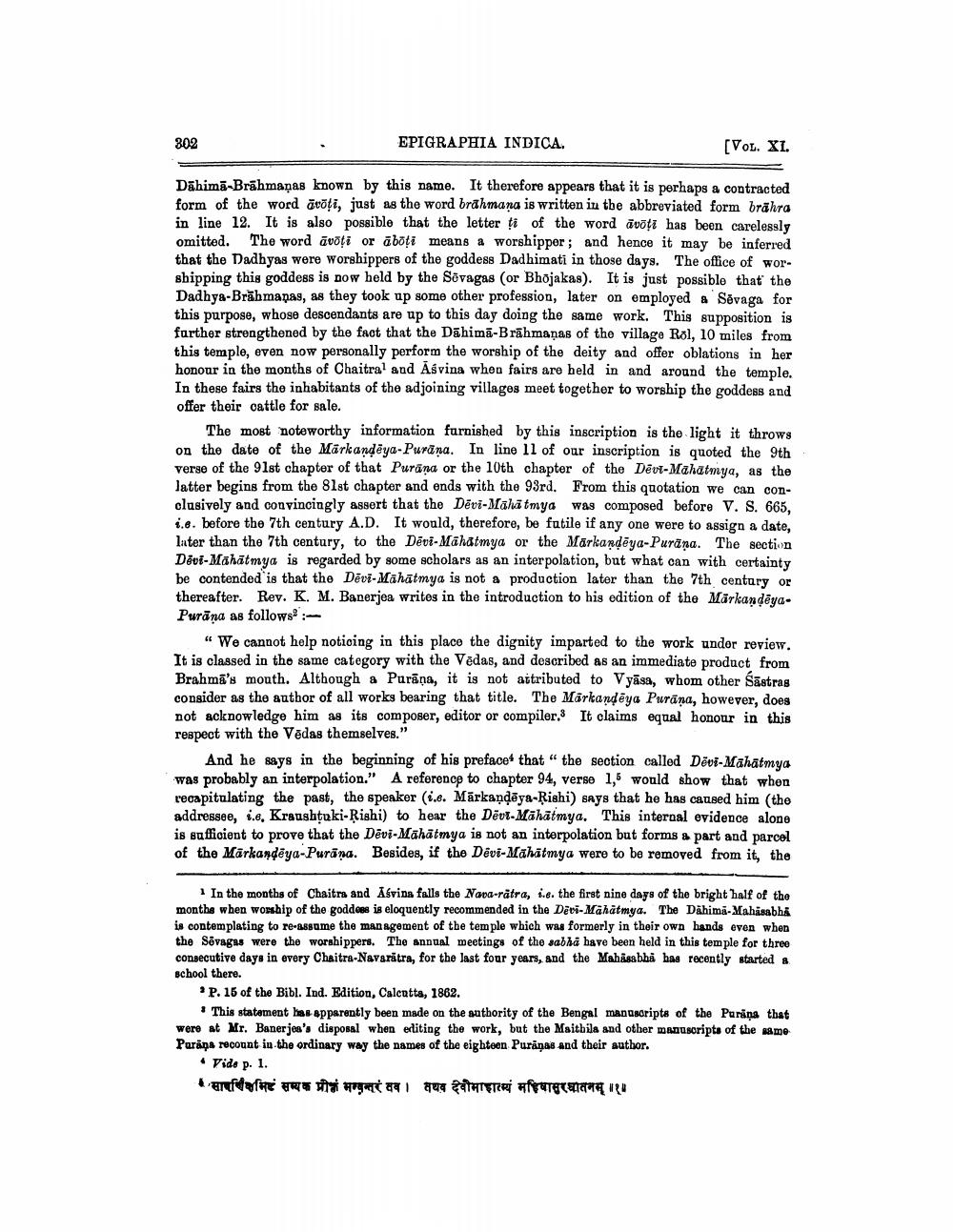________________
802
EPIGRAPHIA INDICA.
[VOL. XI.
Dahimā-Brāhmaṇas known by this name. It therefore appears that it is perhaps a contracted form of the word āvoti, just as the word brahmana is written in the abbreviated form brähra in line 12. It is also possible that the letter ti of the word ävöţi has been carelessly omitted. The word avöți or āboți means a worshipper; and hence it may be inferred that the Dadhyas were worshippers of the goddess Dadhimati in those days. The office of worshipping this goddess is now held by the Sēvagas (or Bhojakas). It is just possible that the Dadhya-Brāhmaṇas, as they took up some other profession, later on employed a Sévaga for this purpose, whose descendants are up to this day doing the same work. This supposition is farther strengthened by the fact that the Dāhimā-Brāhmaṇas of the village Rol, 10 miles from this temple, even now personally perform the worship of the deity and offer oblations in her honour in the months of Chaitral and Aśvina when fairs are held in and around the temple. In these fairs the inhabitants of the adjoining villages meet together to worship the goddess and offer their cattle for sale.
The most noteworthy information furnished by this inscription is the light it throws on the date of the Märkandeya-Purūna. In line 1l of our inscription is quoted the 9th verse of the 91st chapter of that Purana or the 10th chapter of the Deut-Māhatmya, as the latter begins from the 8lst chapter and ends with the 93rd. From this quotation we can conclusively and convincingly assert that the Devi-Māhātmya was composed before V. S. 665, 1.e. before the 7th century A.D. It would, therefore, be futile if any one were to assign a date, later than the 7th century, to the Dēvi-Māhatmya or the Märkandēya-Purāna. The section Dāvi-Mahātmya is regarded by some scholars as an interpolation, but what can with certainty be contended' is that the Dēvi- Māhātmya is not a production later than the 7th century or thereafter. Rev. K. M. Banerjea writes in the introduction to his edition of the MärkandēyaPurāna as follows:
" We cannot help noticing in this place the dignity imparted to the work under review. It is classed in the same category with the Vedas, and described as an immediate product from Brahma's mouth. Although a Purana, it is not aitributed to Vyāsa, whom other Sāstras consider as the author of all works bearing that title. The Märkandēya Purāna, however, does not acknowledge him as its composer, editor or compiler. It claims equal honour in this respect with the Vēdas themselves."
And he says in the beginning of his preface that "the section called Dövi-Mahatmya was probably an interpolation." A reference to chapter 94, verse 1,5 would show that when recapitulating the past, the speaker (i.6. Mārkandēya-Rishi) says that he has caused him (the addressee, i.e. Kraushtuki-Rishi) to hear the Devt. Māhātmya. This internal evidence alone is sufficient to prove that the Devi-Māhātmya is not an interpolation but forms & part and parcel of the Mārkandēya-Purāna. Besides, if the Devi-Māhātmya were to be removed from it, the
In the months of Chaitra and Asvina falls the Nava-rätra, i.e. the first nine days of the bright half of the months when worship of the godde is eloquently recommended in the Dari-Mahatmya. The Dähima-Mahasabha is contemplating to re-assume the management of the temple which was formerly in their own hands even when the Sovagas were the worshippers. The annual meetings of the sabla have been held in this temple for three consecutive days in every Chaitra-Navaratra, for the last four years, and the Mahasabhi has recently started a school there.
'P. 15 of the Bibl. Ind. Edition, Calcutta, 1862.
* This statement has apparently been made on the suthority of the Bengal manuscripts of the Pariņa that were at Mr. Banerjea's disposal when erliting the work, but the Maithila and other manuscripts of the same Parapa recount in the ordinary way the names of the eighteen Puriņas and their author. • Vide p. 1.
सावर्णिक्षमिष्टं सम्यक प्रीनं मम्वन्तरं वव। वथव देवीमाहात्म्यं महिषासुरवातनम् ॥१॥




